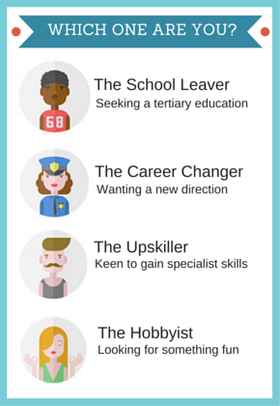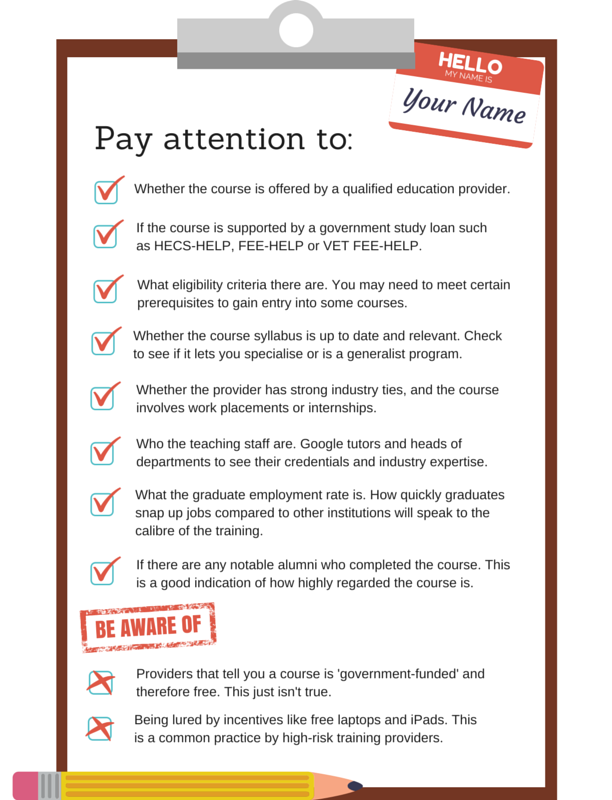Compare courses from top Australian unis, TAFEs and other training organisations.
How to Pick the Right Course for You
Studying is an investment of your time and money. So when it comes to picking the right course for you, make sure you do your homework! Here’s our how-to-guide on choosing the perfect course.
Vivien Luu
May 12,2015
But where do you start? How do you know which course is perfect for you? And with endless study options out there, how do you make sure you’re making the right choice? To answer your questions, we’ve put together a simple four-step guide to picking the perfect course. Think of it as a checklist that’ll help guide you to study success!
1. First things first, know your end goal
This one’s simple. Just ask yourself, ‘What do you want out of studying?’ Generally speaking your end goals will depend on what stage of your life you’re at, and where you are in your career.
If you’re fresh out of high school, chances are your goal is to simply gain a qualification that’ll help kick-start your career, and land you a job. If you’re a working professional however, you might be after a qualification to help you gain a promotion or specialise in a new field.
Knowing the purpose of your studies is really important. It’ll help keep you focused in your search for the ideal course, and will help you prioritise what you ‘must-have’, and what’s ‘nice-to-have’.
Career changers and school leavers
If your end goal is to start your career, you should look for courses that provide:
- Work placements and internships to build up your industry connections and improve your employment prospects.
- Access to industry-standard technologies, resources and practices to ensure you graduate with job-ready skills.
- A culture that fosters ambitious like-minded students. Once you graduate, your fellow students will become valuable industry contacts – potential colleagues, employers and business partners.
- A nationally recognised and accredited qualification, so you can be assured your future employers will recognise your certification.
Upskillers
If your end goal is to gain a promotion or specialise your skillset, look for courses that:
- Are highly regarded by your industry.
- Provide sought-after skills that add on to the experience and education you already have.
- Offer flexible learning options so you can keep working while you study.
2. Now get practical
Now ask yourself, ‘How much time and money am I able to invest in my studies?’
Considering such practicalities are a simple but effective way of figuring out whether you need to study part-time or full-time, or whether an online or on-campus course is best for you.
Time
If you’re able to commit to a full-time study load, then full-time or even fast-tracked qualifications are definitely the best way to go. But if you’re time poor and need to juggle work or family (or both!) with your studies, your best bet is to study part-time or look for a course that provides flexible learning. This might involve studying online, attending night classes or learning at your own pace.
Money
There’s no doubt about it, getting an education can be very expensive. So it’s important to consider how much a course costs, and what the return-on-investment will be for you. In most cases, having a degree or VET qualification will improve your employment prospects and earning potential.
If you can’t afford to pay your tuition fees upfront, you can consider:
- Studying a course that is eligible for a government study loan – allowing you to study now, and pay your fees back later. The HELP assistance scheme can be pretty confusing, so we’ve nutted it all out for you.
- Asking your workplace to foot the bill. If the course bolsters your skillset, and adds value to your company, there’s a high chance your boss will be more than happy to pay for your professional development.
Travel
For those of you living in remote or rural regions, picking a course to study will inevitably bring up questions such as, ‘Are you willing to move?’ and if not, ‘How much of a commute are you willing to endure?’ A simple solution to these questions might be studying by distance or online – study options that a lot of reputable providers offer these days.
For city dwellers, the issue of travel time is just as relevant, especially if you’re a time-poor working professional. If the course you’re interested in is widely available, look for providers that have nearby campuses, or consider studying online.
3. Research, research and research some more
Now that you’ve built up a clear idea of what you want out of your studies, and know exactly what your course ‘specs’ are, it’s time to start researching!
How to do this:
Attend open days and career expos
They’re a great way for you to get a feel for the campus, connect with current students and chat to course lecturers and coordinators. School leavers might especially enjoy the HSC and Careers Expo – an annual expo that connects students to Australia’s best universities and education providers.
Talk to people
It might sound simple, but the best way to get an insight into a course is to just chat to people about it. Ask lecturers, students (both present and past), and industry professionals about their thoughts on a course, and how it’s run. A provider’s student centre might also be a handy place to get your questions answered.
Do a taster course
If you’re still on the fence, studying a short course is a great way to test the waters before you commit to completing an entire course. Open Universities Australia even offer single units that can be completed in just 13 weeks, and any units you complete will be recognised if you choose to continue studying with the full degree. Some of their most popular units include:
4. What to look for
To aid the research process, here’s a checklist of things you ought to be looking out for.
Ready to start looking for the perfect course? Start your search today with our list of 500+ online courses!
About the author
Viv is a writer who enjoys researching and writing about creativity, how the human mind works, and neuro processes. She values creativity above all else and admires people who pursue their career dreams, no matter the sacrifice. In her spare time, she binges on HBO shows and epic fantasy novels.



